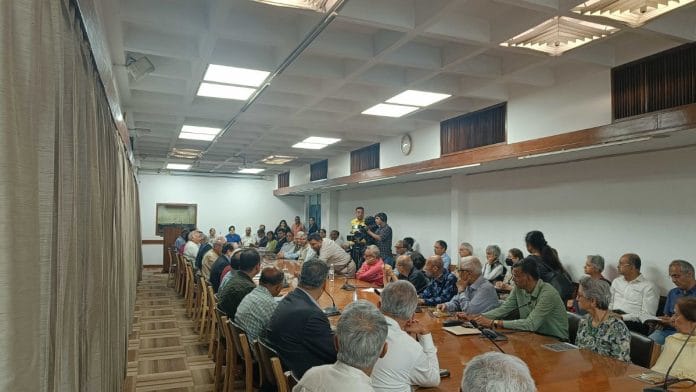New Delhi: The launch of former Minister of Law and Justice Ashwani Kumar’s book A Democracy in Retreat: Revisiting the Ends of Power at the India International Centre morphed into a class on freedom and the Constitution on 4 April, with couplets by Mirza Ghalib, Rahat Indori and Allama Iqbal thrown in.
“We have gone back to the cash and carry an aspect of politics,” said Kumar in conversation with former Supreme Court judge AK Sikri, former diplomat Pavan Varma, and journalist Neerja Chowdhury. They were discussing the Supreme Court judgment striking down the electoral bond scheme, which provided anonymity to political party donors. Moderated by former Foreign Secretary Shyam Saran, the talk touched upon funding for parties, the way forward, and institutions that they believed were once the bedrock of Indian democracy. All through the lens of the Lok Sabha elections that begin on 19 April.
While the judgment itself was appreciated, it raised the question of constitutional purpose, said Kumar, while talking about the lack of transparency when it comes to political funding.
“Nobody really pondered on what the effect of the judgment would be. You may anchor a judgment in some constitutional principles and write a theory around it. But a judicial adjudication must achieve a purpose,” he said, stressing that the ruling dispensations, at the Centre or the state, would stand to gain.
The conversation swiftly moved on to the functioning of a healthy democracy, and the role of institutions such as the Election Commission of India (ECI), investigating agencies and the judiciary. All the speakers agreed that democracy—which is founded on certain values and principles with a dose of idealism—holds upright when its institutions are properly working.
Varma turned to a couplet by Tulsidas to make a point on unchecked power and arrogance. No one yet has been born in this world who, when restored with power, can avoid arrogance. He said that what’s missing is a strong united pan-Indian Opposition with a narrative, leadership and strategy.
“We will always retreat if there are not enough checks and balances. There is always a danger,” he said, adding that India has probably never seen a more electorally reluctant Opposition.
Also read: Hindi writers showdown at Delhi event. Readers take a backseat as egos clash
Role of institutions
At one point in the discussion, Sikri asked whether the majority rule is the only thing that makes for a democracy. And then answered himself with a resounding “no”.
“The majority may have a right to rule but then that doesn’t mean that the rule can be or the governance can be in any manner it wants,” he said.
The power now lies with the people of India, on whom Varma is resting his hopes. “Is bulandi ke nassebo main hai pasti ek din (every pinnacle has within it the seeds of its own decline),” he said, quoting a Ghalib couplet. “The ultimate arbiters of preventing the retreat of democracy will be the people of India.”
Kumar agreed with him while touching upon the role of India’s institutions from the executive to the judiciary. Chowdhury was on the same page.
“The strengthening of our democratic institutions is the prime need. Leaders will come. Leaders will go. But if there are no institutions, we will not be able to have the checks and balances,” said Chowdhury.
Kumar, however, cautioned against relying on institutions to protect democracy. “They are also manned by people who are reflective of the faults and inadequacies of ordinary mortals like us. They have not come from somewhere in heaven,” he said. “Democracy will be rescued by the people themselves, from whom all democratic institutions derive power.”
Democracy with fault lines
Many of the panellists mourned the virtual breakdown of communication between the ruling side and the Opposition, which Kumar has written about in his book. Saran recalled how former prime minister PV Narasimha Rao requested then leader of Opposition Atal Bihari Vajpayee to lead India’s delegation to the United Nations for a debate on Kashmir. Vajpayee accepted the offer.
“Those were very different times. It is difficult to envisage something like that happening today. And it’s a big loss,” said Saran.
Chowdhury put it down to an absence of conversation across the political spectrum. “Times have changed, and today politics is becoming a game of conspiracies and counter-conspiracies. And, the Opposition may not know how to handle it.”
She then turned to Mani Shankar Aiyar, who was in the audience, and asked him why the Congress was not acting like a strong Opposition. Ever the diplomat, the Congress leader brushed away the probing questions, saying that he was attending the launch in the capacity of Kumar’s friend.
Varma ended the discussion with a couplet by Rahat Indori: Jo aaj sahib-e-masnad hain, kal nahi honge, kiraydaar hain, zaati makaan thodi hain, sabhi ka khoon shamil hain yaha ki mitti mein, kisi ke baap ka Hindustan thodi hain. (Whoever sits on the throne today, won’t be there tomorrow. They are the tenants, not landlords. Everyone’s blood is part of this soil. Hindustan does not belong to anyone’s father. )
“That is why I say democracy will triumph,” he said.
(Edited by Ratan Priya)






